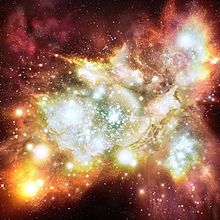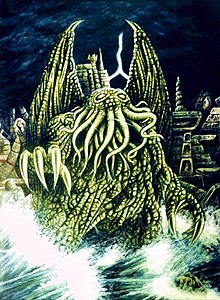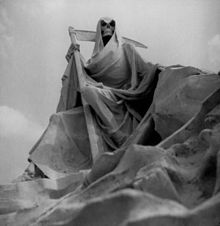Cthulhu Mythos


The Cthulhu Mythos, also known as the Lovecraft Mythos, is a shared fictional universe created in the 1920s by American horror writer H. P. Lovecraft. During the latter part of Lovecraft's life, there was much borrowing of story elements among the authors of the "Lovecraft Circle", and many others, a clique of writers with whom Lovecraft corresponded. This group included Clark Ashton Smith, Robert E. Howard, Robert Bloch, Frank Belknap Long, and Henry Kuttner. The term was coined by Lovecraft's associate August Derleth, and named after Cthulhu, a powerful fictional entity in Lovecraft's stories. It refers to a loose framework formed by common elements (such as places, names, or entities) that appear in more than one tale, adding continuity and depth to the works.
Authors writing in the Lovecraftian milieu have continued to use elements of the mythos in an ongoing expansion of the fictional universe, sometimes in ways far removed from Lovecraft's original conception. The mythos is not necessarily consistent from story to story, as many writers, including Lovecraft himself, would frequently alter dates, names, and locations to suit the framework of one particular work.
Fiction[edit]
Robert E. Howard[edit]
- And the thought recurs to me--if such a monstrous entity as the Master of the Monolith somehow survived its own unspeakably distant epoch so long--what nameless shapes may even now lurk in the dark places of the world?
- In those grisly eyes were mirrored all the unholy things and vile secrets that sleep in the cities under the sea, and that skulk from the light of day in the blackness of primordial caverns. And so that ghastly thing that the unhallowed ritual of cruelty and sadism and blood had evoked from the silence of the hills, leered and blinked down on its bestial worshippers, who groveled in abhorrent abasement before it.
- The Black Stone
Frank Belknap Long[edit]
The Hounds of Tindalos[edit]
- "God in heaven!" he cried. "I see!"
...
he shrieked. "I see everything. All of the billions of lives that preceded me on this planet are before me at this moment. I see men of all ages, all races, all colors..."
- "All about me there are angels--strange angels that have no counterparts on the earth. I am desperately afraid."
"There is an abyss of being which man has never fathomed."
...
"I am passing through unearthly angles; I am approaching--oh, the burning horror of it."
- "No words in our language can describe them!" He spoke in a hoarse whisper. "They are symbolized vaguely in the myth of the Fall, and in an obscene form which is occasionally found engraved on ancient tablets. The Greeks had a name for them, which veiled their essential foulness. The tree, the snake, and the apple--these are the vague symbobls of a most awful mystery."
His voice had risen to a scream. "Frank, Frank, a terrible and unspeakable deed was done in the beginning. Before time, the deed, and from the deed--"
He had risen and was hysterically pacing the room. "The deeds of the dead move through angles in dim recesses of time. They are hungry and athirst!".
- All the evil in the universe was concentrated in their lean, hungry bodies. Or had they bodies? I saw them only for a moment; I cannot be certain. But I heard them breathe. Indescribably for a moment I felt their breath upon my face. They turned toward me and I fled screaming. In a single moment I fled screaming through time. I fled down quintillions of years.
H. P. Lovecraft[edit]
- What do we know … of the world and the universe about us? Our means of receiving impressions are absurdly few, and our notions of surrounding objects infinitely narrow. We see things only as we are constructed to see them, and can gain no idea of their absolute nature. With five feeble senses we pretend to comprehend the boundlessly complex cosmos, yet other beings with wider, stronger, or different range of senses might not only see very differently the things we see, but might see and study whole worlds of matter, energy, and life which lie close at hand yet can never be detected with the senses we have.
- "From Beyond" Written November 16, 1920, published June 1934 in The Fantasy Fan, 1.
- Life is a hideous thing, and from the background behind what we know of it peer daemoniacal hints of truth which make it sometimes a thousandfold more hideous. Science, already oppressive with its shocking revelations, will perhaps be the ultimate exterminator of our human species — if separate species we be — for its reserve of unguessed horrors could never be borne by mortal brains if loosed upon the world.
- "Facts Concerning the Late Arthur Jermyn and His Family" - written 1920; first published in The Wolverine, No. 9 (March 1921).
- Madness rides the star-wind... claws and teeth sharpened on centuries of corpses... dripping death astride a bacchanale of bats from nigh-black ruins of buried temples of Belial...
- "The Hound" Written September 1922, published February 1924 in Weird Tales, 3, No. 2, 50–52, 78.
- Memories and possibilities are ever more hideous than realities.
- "Herbert West : Re-Animator" in "Home Brew" Vol. 1, No. 1 (February 1922).
- The only saving grace of the present is that it's too damned stupid to question the past very closely.
- "Pickman's Model" - written 1926; first published in Weird Tales, Vol. 10, No. 4 (October 1927).
- Yog-Sothoth knows the gate. Yog-Sothoth is the gate. Yog-Sothoth is the key and guardian of the gate. Past, present, future, all are one in Yog-Sothoth. He knows where the Old Ones broke through of old, and where They shall break through again. He knows where They have trod earth's fields, and where They still tread them, and why no one can behold Them as They tread.
- "The Dunwich Horror " - Written Summer 1928; first published in Weird Tales, 13, No. 4, (April 1929).

- It was an All-in-One and One-in-All of limitless being and self — not merely a thing of one Space-Time continuum, but allied to the ultimate animating essence of existence's whole unbounded sweep — the last, utter sweep which has no confines and which outreaches fancy and mathematics alike. It was perhaps that which certain secret cults of earth have whispered of as YOG-SOTHOTH, and which has been a deity under other names; that which the crustaceans of Yuggoth worship as the Beyond-One, and which the vaporous brains of the spiral nebulae know by an untranslatable Sign...
- "Through the Gates of the Silver Key " - written with E. Hoffman Price, October 1932 - Apr 1933; first published in Weird Tales, Vol. 24, No. 1 (July 1934).
- The other gods! The other gods! The gods of the outer hells that guard the feeble gods of earth!... Look away... Go back... Do not see! Do not see! The vengeance of the infinite abysses... That cursed, that damnable pit... Merciful gods of earth, I am falling into the sky!
- The Other Gods Written on August 14, 1921, first published in The Fantasy Fan (November 1933).
- May the merciful gods, if indeed there be such, guard those hours when no power of the will, or drug that the cunning of man devises, can keep me from the chasm of sleep. Death is merciful, for there is no return therefrom, but with him who has come back out of the nethermost chambers of night, haggard and knowing, peace rests nevermore. Fool that I was to plunge with such unsanctioned frensy into mysteries no man was meant to penetrate; fool or god that he was — my only friend, who led me and went before me, and who in the end passed into terrors which may yet be mine!
- Hypnos Written March 1922; First published in The National Amateur Vol. 45, No. 5 (May 1923).
The Call of Cthulhu (1926)[edit]


And with strange aeons even death may die.
- The most merciful thing in the world, I think, is the inability of the human mind to correlate all its contents. We live on a placid island of ignorance in the midst of black seas of infinity, and it was not meant that we should voyage far. The sciences, each straining in its own direction, have hitherto harmed us little; but some day the piecing together of dissociated knowledge will open up such terrifying vistas of reality, and of our frightful position therein, that we shall either go mad from the revelation or flee from the light into the peace and safety of a new dark age.
- Theosophists have guessed at the awesome grandeur of the cosmic cycle wherein our world and human race form transient incidents. They have hinted at strange survivals in terms which would freeze the blood if not masked by a bland optimism. But it is not from them that there came the single glimpse of forbidden eons which chills me when I think of it and maddens me when I dream of it. That glimpse, like all dread glimpses of truth, flashed out from an accidental piecing together of separated things — in this case an old newspaper item and the notes of a dead professor....
- What, in substance, both the Esquimaux wizards and the Louisiana swamp-priests had chanted to their kindred idols was something very like this: the word-divisions being guessed at from traditional breaks in the phrase as chanted aloud:
"Ph'nglui mglw'nafh Cthulhu R'lyeh wgah'nagl fhtagn." ... "In his house at R'lyeh dead Cthulhu waits dreaming."
- They worshipped, so they said, the Great Old Ones who lived ages before there were any men, and who came to the young world out of the sky. Those Old Ones were gone now, inside the earth and under the sea; but their dead bodies had told their secrets in dreams to the first men, who formed a cult which had never died. This was that cult, and the prisoners said it had always existed and always would exist, hidden in distant wastes and dark places all over the world until the time when the great priest Cthulhu, from his dark house in the mighty city of R'lyeh under the waters, should rise and bring the earth again beneath his sway. Some day he would call, when the stars were ready, and the secret cult would always be waiting to liberate him.
- There had been aeons when other Things ruled on the earth, and They had had great cities. Remains of Them, he said the deathless Chinamen had told him, were still be found as Cyclopean stones on islands in the Pacific. They all died vast epochs of time before men came, but there were arts which could revive Them when the stars had come round again to the right positions in the cycle of eternity. They had, indeed, come themselves from the stars, and brought Their images with Them.
These Great Old Ones, Castro continued, were not composed altogether of flesh and blood. They had shape — for did not this star-fashioned image prove it? — but that shape was not made of matter. When the stars were right, They could plunge from world to world through the sky; but when the stars were wrong, They could not live. But although They no longer lived, They would never really die...
- That cult would never die till the stars came right again, and the secret priests would take great Cthulhu from His tomb to revive His subjects and resume His rule of earth. The time would be easy to know, for then mankind would have become as the Great Old Ones; free and wild and beyond good and evil, with laws and morals thrown aside and all men shouting and killing and revelling in joy. Then the liberated Old Ones would teach them new ways to shout and kill and revel and enjoy themselves, and all the earth would flame with a holocaust of ecstasy and freedom. Meanwhile the cult, by appropriate rites, must keep alive the memory of those ancient ways and shadow forth the prophecy of their return.
- No book had ever really hinted of it, though the deathless Chinamen said that there were double meanings in the Necronomicon of the mad Arab Abdul Alhazred which the initiated might read as they chose, especially the much-discussed couplet:
- That is not dead which can eternal lie,
And with strange aeons even death may die.
- That is not dead which can eternal lie,
- I have looked upon all that the universe has to hold of horror, and even the skies of spring and the flowers of summer must ever afterward be poison to me. But I do not think my life will be long. As my uncle went, as poor Johansen went, so I shall go. I know too much, and the cult still lives.
- Who knows the end? What has risen may sink, and what has sunk may rise. Loathsomeness waits and dreams in the deep, and decay spreads over the tottering cities of men.
Non-Fiction[edit]
H. P. Lovecraft[edit]
- It is good to be a cynic — it is better to be a contented cat — and it is best not to exist at all. Universal suicide is the most logical thing in the world — we reject it only because of our primitive cowardice and childish fear of the dark. If we were sensible we would seek death — the same blissful blank which we enjoyed before we existed.
- "Nietzscheism and Realism" from The Rainbow, Vol. I, No. 1 (October 1921); reprinted in "To Quebec and the Stars".
- The oldest and strongest emotion of mankind is fear, and the oldest and strongest kind of fear is fear of the unknown.
- "Supernatural Horror in Literature" (1927).
- Children will always be afraid of the dark, and men with minds sensitive to hereditary impulse will always tremble at the thought of the hidden and fathomless worlds of strange life which may pulsate in the gulfs beyond the stars, or press hideously upon our own globe in unholy dimensions which only the dead and the moonstruck can glimpse.
- "Supernatural Horror in Literature" (1927).

